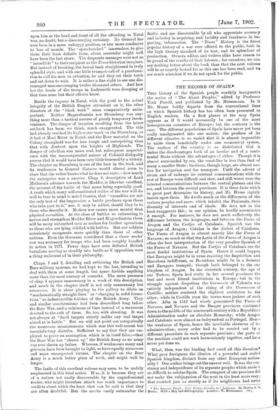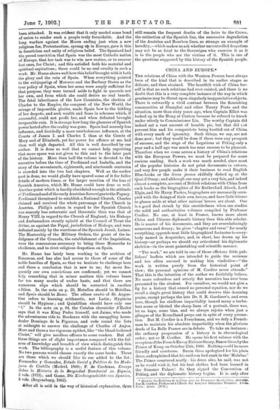THE RECORD OF SPAIN.* Tins history of the Spanish people
worthily inaugurates the series of " The Great Peoples," edited by Professor York Powell, and published by Mr. Heinemann. In it Mr. Hume boldly departs from the conventional lines on which Spanish history has too often been presented to English readers. On a first glance at the map Spain appears as if it would necessarily be one of the most homogeneous countries of Europe ; but the contrary is the case. The different populations of Spain have never yet been really amalgamated into one nation; the produce of its different climates is so varied that it is almost impossible to unite them beneficially under one economical system. The surface of the country is so distributed that it unites the disadvantages both of an insular and of a conti- nental State without the advantages of either. Though it is almost surrounded by sea, the coast-line is less than that of many a smaller State ; its rivers, though large, are almost use- less for navigation and for transport. Until the advent of steam and of railways its external communications with the rest of Europe were difficult and slow, and still worse were the internal communications between the central plateau and the sea, and between the several provinces. It is these facts which in great part determine its history, and Mr. Hume rightly insists upon them. He dwells much on the differences of the various peoples and races which inhabit the Peninsula, their diversity of interests and of ideals. He does not in the least exaggerate this ; in our opinion, he hardly accentuates it enough. For instance, he does not mark sufficiently the difference between the languages, and between the Fuero of Aragon and the Usatjes of Catalonia. Spanish was the language of Aragon ; Catalan is the dialect of Catalonia. The Fuero of Aragon is almost exactly like the Fuero of Navarre ; so much so that the Latin of the Fuero of Aragon is often the best interpretation of the very peculiar Spanish of the Fuero of Navarre. But the Usatjes of Catalonia are the most feudal institutions of Spain. Hence it could happen that Zaragoza might be in arms resisting the Inquisition and Barcelona indifferent, or Barcelona might be in a ferment and Zaragoza tranquil; though both belonged to the one kingdom of Aragon. In the sixteenth century, the age of our Tudors, Spain had really in her several provinces the best and most liberal institutions in Europe ; but in the struggle against despotism the Germania of Valencia, was entirely independent of the rising of the Comuneros of Castille; neither rendered the slightest assistance to the other ; while in Castille even the towns were jealous of each other. Alba in 1512 had wisely guaranteed the Fuero of Navarre, and Navarre and the Basque provinces continued down to the middle of the nineteenth century with a Republican Administration under an absolute Monarchy; while Aragon and Catalonia were almost as independent as Portugal. Hence the weakness of Spain, hence the inevitable slowness of its administration ; every order had to be carried out by a different procedure in each separate province ; the parts of the machine could not work harmoniously together, and have never yet done so.
What, then, was the binding fact amid all this disunion? What gave foreigners the illusion of a powerful and united Spanish kingdom, distinct from any other European nation- ality ? Our author brings out the answer well. It was the con- stancy and independence of its separate peoples which made it so difficult to subdue Spain. The conquest of one province did not make the subjugation of the next in the least more easy ; that resisted just as stoutly as if its neighbours had never
• The Spanish People : their Origin, Growth, and Influence. By Martin A. S. Hume. With a Map and Bibliography. London : W. Heinemauu.
been attacked. It was evident that it only needed some bond of union to render such a people truly formidable. And the long warfare against the Moors ending just when a new religions foe, Protestantism, sprang ut in Europe, gave it this in fanaticism and unity of religious belief. The Spaniard had the proud conviction that Spain was the most Catholic nation of Europe, that her task was to win new realms, or to recover lost ones, for Christ; and this satisfied both his material and spiritual aspirations ; there could be no real cruelty in such a work. Mr. Hume shows well how this belief brought with it both the glory and the ruin of Spain. When everything pointed to the subjugativ of Morocco and the Barbary States as the true policy of Spain, when her arms were amply sufficient for that purpose, they were turned aside to fight in quarrels not her own, and from which she could derive no real benefit. The fatal inheritance of the Low Countries, the election of Charles to the Empire, the conquest of the New World, the mirage of impossible glories, made Spain bow to the bidding of her despots, and seek wealth and fame in schemes which, if successful, could not profit her, and when defeated brought irreparable ruin. It is strange how long the glamour of Spanish power lasted after the reality was gone. Spain had scarcely less influence, and decidedly a more unwholesome influence, at the Courts of James L and Charles I. than at the Courts of Mary and of Elizabeth, yet her power for offence at sea had then well nigh departed. All this is well described by our author. It is done so well that we cannot help regretting that more space was not given to this and to the later part of the history. More than half the volume is devoted to the narrative before the time of Ferdinand and Isabella, and the story of the seventeenth, eighteenth, and nineteenth centuries is crowded into the two last chapters. Well as the earlier part is done, we would gladly have spared some of it for fuller details of modern times, or for larger mention of the loss of Spanish America, which Mr. Hume could have done so well. Another point which is hardly elucidated enough is the attitude of Ferdinand and of the early Austrian Sovereigns to the Papacy. Ferdinand threatened to establish a National Church. Charles claimed and received the whole patronage of the Church in America. Philip's action in regard to the Spanish Church was scarcely less autocratic and theocratic than was that of Henry VIII. in regard to the Church of England; his Bishops and Ambassadors stoutly upheld at the Council of Trent the divine, as against the Papal, jurisdiction of Bishops, and were defeated mainly by the exertions of the Spanish Jesuit, Lainez. The Mastership of the Military Orders, the grant of the in- dulgence of the Cruzada, the establishment of the Inquisition, were the concessions necessary to bring these Monarchs to obedience, and to rivet religious despotism on Spain.
Mr. Hume has lately been working in the archives of Simancas, and has also had access to those of some of the noble families of Spain, so that we hesitate to challenge here and there a conclusion that is new to us; far more fre- quently our own convictions are confirmed; yet we cannot help remarking that in minor matters this volume bears far too many marks of undue haste, and that there are numerous slips which should be corrected in another edition. In the note on p. 29, Metullus should be Metellus, and Spain should be Rome. The odiosa cantio of St. Augus- tine refers to learning arithmetic, not Latin ; Hyginius should be Hyginus ; and Quintillian should have only one "1." In the note on p. 94, the Catalan chronicler d'Esclot says that it was King Pedro himself, not Jaime, who made the adventurous ride to Bordeaux with the smuggling horse- dealer Domingo de la Figueras, and rode round the lists at midnight to answer the challenge of Charles of Anjou. Here and there a too vigorous epithet, like " the blood-boltered Christ," will give needless offence to some readers. But all these things are of slight importance compared with the ful- ness of knowledge and breadth of view which distinguish this work. The bibliography is a useful feature of this volume. No two persons would choose exactly the same books. There are three which we should like to see added to the list : Fernandez y Gonzalez, Estado Social y Politico de los Mude- jares de Castilla (Madrid, 1866) ; F. de Cardenas, Ensayo Sobre la Historia de la Bropiedad Territorial en Espana, 2 vols. (1873); and Gams, The Kirchengeschichte von Spanien, 6 vols. (Regensburg, 1862).
After all is said in the way of historical explanation, there
still remain the frequent deaths of the heirs to the Crown, the extinction of the Spanish line, the successive degradation of the Austrian and Bourbon lines, so strange an example of heredity,—which makes us ask whether uncontrolled despotism may not be as fatal to the Sovereigns who exercise it as it is to the people who are the victims of it. This is one of the questions suggested by this history of the Spanish people.







































 Previous page
Previous page